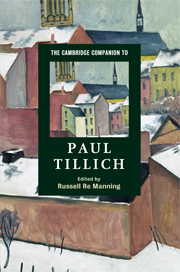Book contents
- Frontmatter
- Part I Standing within the theological circle
- Part II Theology of culture
- 8 Tillich’s analysis of the spiritual situation of his time(s)
- 9 Theology of culture and its future
- 10 Tillich’s theology of art
- 11 Tillich’s philosophy
- 12 Tillich’s ethics between politics and ontology
- 13 On the boundary of utopia and politics
- Part III Tillich in dialogue
- Bibliography
- Index
12 - Tillich’s ethics between politics and ontology
from Part II - Theology of culture
Published online by Cambridge University Press: 28 May 2009
- Frontmatter
- Part I Standing within the theological circle
- Part II Theology of culture
- 8 Tillich’s analysis of the spiritual situation of his time(s)
- 9 Theology of culture and its future
- 10 Tillich’s theology of art
- 11 Tillich’s philosophy
- 12 Tillich’s ethics between politics and ontology
- 13 On the boundary of utopia and politics
- Part III Tillich in dialogue
- Bibliography
- Index
Summary
“I am convinced that we shall overcome because the arc of the universe is long but it bends toward justice.” Martin Luther King, Jr / “Justice is not an abstract ideal standing over existence; it is the fulfillment of primal being, the fulfillment of that which was intended by the origin.” Paul Tillich / The young Martin Luther King, Jr focused on Paul Tillich as one of the two major thinkers treated in his doctoral dissertation at Boston University in 1955. King displayed in that work little of the ethical concern with racism for which he later became so well known. Nevertheless, the oft-quoted words of 1968 in the epigraph above, taken from his later moral struggle in the civil rights movement and against the Vietnam War, offer an artful rendering of a key feature of Tillich's ethical vision. Like Tillich, King presents justice here neither as precept of a demanding divinity nor as mandate of a table of commandments, nor, primarily, as the virtue of the good person. Instead, King presumes justice to be so etched into the order of things that the universe may be said to arc towards it. Moreover, King's words traced that arc towards justice to motivate a people. It was meant to inspire, and part of its capacity to inspire amid political struggle was an ontological presumption that the universe, in which we all already participate, is, in spite of every political corruption and systematic distortion, created from its origins with an arc that points and carries a struggling people towards justice.
- Type
- Chapter
- Information
- The Cambridge Companion to Paul Tillich , pp. 189 - 207Publisher: Cambridge University PressPrint publication year: 2009
- 7
- Cited by



